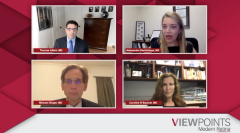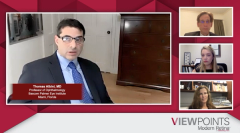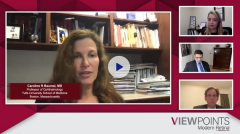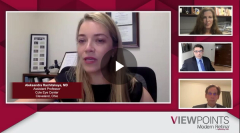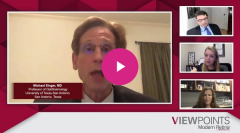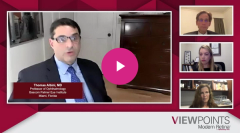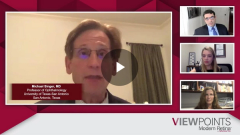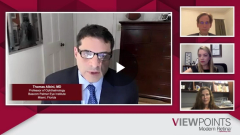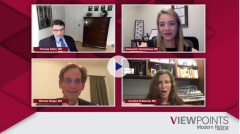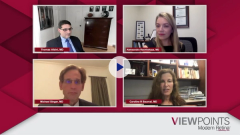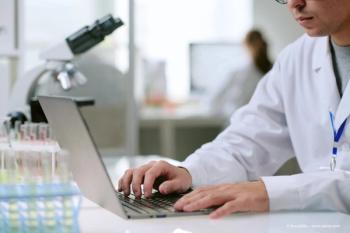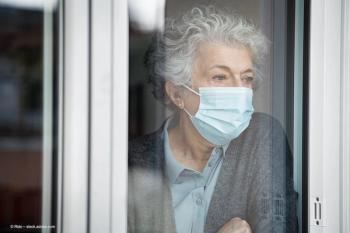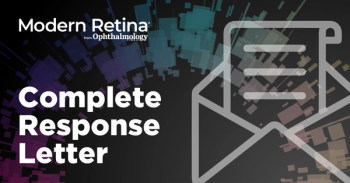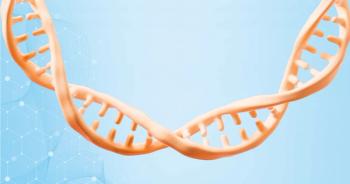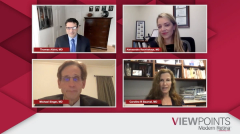
Final thoughts on the progression of treatment for wet AMD
Episodes in this series

Caroline Baumal, MD: Let’s have a wrap-up comment from everyone about neovascular AMD [age-related macular degeneration]. Tell me what you think is exciting, or just say anything you want to say. Let’s start with Aleksandra.
Aleksandra Rachitskaya, MD: We covered a lot of ground and a lot of topics. The future is promising for neovascular AMD. There is a lot of work being done, both on the imaging side and on the therapeutics side. I have to say that COVID-19 [coronavirus disease 2019] obviously has been challenging for us and for our patients, but at the same time, I am so glad that it allows us to do this. In reality, it probably would have been so hard to get all 4 of us in the same room to do this program. There is that silver lining, and I appreciate being here with all you guys.
Caroline Baumal, MD: That’s great. Tom?
Thomas Albini, MD: To me, the thing that stands out the most is the historical perspective. I finished my fellowship training in 2006. Pegaptanib was FDA approved in December 2004, and the bevacizumab articles first came out in 2005. I was right on the cusp of that era. I remember patients losing vision from wet AMD without really any recourse. Aleksandra had the patient who let 1 eye go. They just did really badly, and we do not even see that now. People who have been training since then do not appreciate what the natural history of this disease is. We have an amazing group of drugs to choose from. The armamentarium, by all accounts, seems to be getting better as we are going forward, and it is just important to refer these patients and to work them up appropriately so we can make the diagnosis. It is an amazing era and has been a huge change for ophthalmology.
Caroline Baumal, MD: So true. Mike?
Michael Singer, MD: I echo what my other colleagues have said. I have the historical perspective to see what life was like when PDT [photodynamic therapy] was your option. We talked about the words less bad—I never used to say the word better—and now we’re talking about restoration. It is amazing. It is funny because I’ve had frustration over the years, watching other fields of medicine like oncology have multiple mechanisms of action using combination and chemotherapy, and what is really nice is we are going there.
I look at the development in the same way I look at development of the portable telephone. You make a revolutionary thing like an iPhone, and then it is followed by another revolution, like a video phone. We are about to hit that revolution again with the fact that we have got new ways of taking care of patients, new mechanisms of action, and new mechanisms of delivery. It is a great time to be in retina, and our patients are the ones who are going to benefit. What is really nice, to speak to Tom’s point, is that you are not going to see as many people be legally blind. I remember when we heard what the No. 1 cause of blindness is, and it’s no longer AMD. That is because of the anti-VEGF drugs. It is great that our field is really changing the way we look at things, and the hope is that it is going to get better.
Caroline Baumal, MD: You guys have all given me hope. It was so nice to talk to you all. I agree: We are lucky. We are in 1 of the best fields of medicine because we can do so much to help our patients, and we have come so far. We have such amazing colleagues, and we all work together. The No. 1 thing is we want to do the best for our patients and give them the best care. I am really excited to try to figure out a little more about the science of AMD and why some people get anti-VEGF responsive diseases and other people do not. They get geographic atrophy, and that has become, as patients get older, more of a problem. What is the switch that makes you experience 1 form of advanced AMD that is dry, and what causes the other patients to go to wet? We have so much more to learn.
I want to thank all of you for being here today. I want to thank our audience. We hope you found the viewpoints to be rich and informative. I hope we get to meet one another soon in person or, if not, by Zoom again. We will take what we can get. Thank you, everybody.
Newsletter
Keep your retina practice on the forefront—subscribe for expert analysis and emerging trends in retinal disease management.

